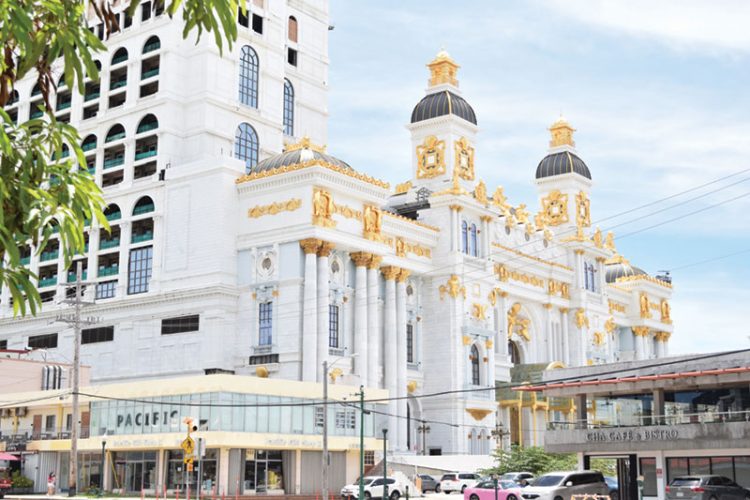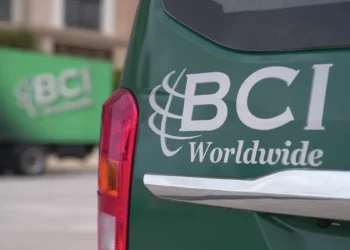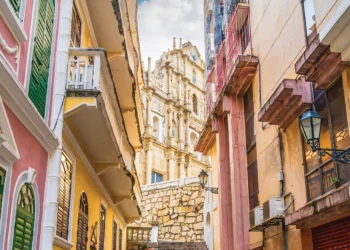With its incredible VIP roll reports long gone, Imperial Pacific International has appointed a new CEO as it looks for another extension of its deadline to finish its beachfront casino hotel in Saipan – but its finances may be running out of time.
Five years after opening a casino in a shopping mall in the middle of the Pacific Ocean that reported greater rolling volumes than Cotai VIP operations, Imperial Pacific International has built a stunning track record of losses, unpaid bills, broken lives and broken promises. IPI’s new Saipan CEO Donald Browne aims to change that.
“We refuse to allow past events to distract or derail us in our quest to complete the hotel and its many amenities,” Browne says.
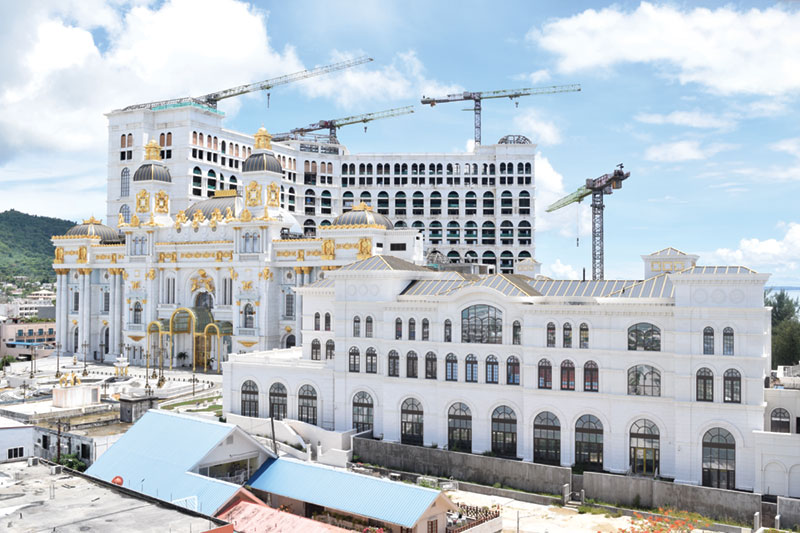 A longtime associate of his predecessor Mark Brown, Browne was named CEO on 17 July under pressure from regulators in the Commonwealth of the Northern Mariana Islands, a US territory best known as a World War II battlefront.
A longtime associate of his predecessor Mark Brown, Browne was named CEO on 17 July under pressure from regulators in the Commonwealth of the Northern Mariana Islands, a US territory best known as a World War II battlefront.
“This is a huge investment not just in a monetary sense, but also in the thousands of hours spent on perfecting processes, training and initiating best practices, to ensure that when we open the hotel component we will not disappoint our guests. We are in the process of rebuilding our organizational structure which will assist to streamline processes and communication flow, create efficiencies and better decision making.”
Browne is confident he can address a US Treasury Financial Crimes Enforcement Network (FinCEN) investigation into apparent violations dating back to October 2016. A record US$75 million FinCEN fine in 2015 triggered the shutdown of Tinian Dynasty, CNMI’s first casino on the island south of Saipan. As well as FinCEN’s probe, the FBI conducted raids on IPI’s office in November last year, apparently looking into its relationship with Governor Ralph Deleon Guerrero Torres and his family. Both investigations continue, raising questions about IPI’s viability, Browne’s confidence notwithstanding.

IPI’s Hong Kong listed shares, trading at HK$0.217 (US$0.028) in July last year, tumbled to HK$0.01 last month after US federal indictments unsealed in August 2020 alleged former IPI executives schemed to import illegal workers from mainland China. The share price drop triggered margin financing limits that forced controlling shareholder Cui Li Je, the mother of IPI mastermind and former Hengsheng Group junket executive Ji Xiaobo, to sell 2.2 billion shares, reducing her ownership stake to 61.93%.
STALE ROLL
From the start, IPI’s outsized VIP numbers made headlines, perhaps what you’d expect from a former Macau junket operator in a jurisdiction allowing visa-free entry to Chinese travelers under a special waiver program, currently suspended due to COVID-19. Since introducing VIP play at its training facility in the DFS Mall in late 2015 through 2019, IPI reported more than US$100 billion in VIP roll – US$49.5 billion in 2017 on 23 VIP tables when Venetian Macao reported US$26.2 billion on 100-plus tables – and US$3.3 billion in VIP revenue.
However, 74% of IPI’s total roll remains uncollected debt. IPI has written off US$2.2 billion in player debt with another US$271 million outstanding at the end of 2019, compared with reported revenue of US$2 billion over those five years. IPI has reported a cumulative loss of US$670 million, including US$498 million last year. The casino, relocated in July 2017 to the unfinished Imperial Palace·Saipan hotel in the Garapan downtown tourist hub, has been closed since 17 March due to COVID-19.
Beyond business losses, IPI owes millions in taxes, fees, contractor bills and legal judgments, some of which it disputes, some it claims would put it out of business. Last year, IPI tried deducting uncollected gaming debts from its 5% gross receipts tax, the only tax due on its gaming revenue. CNMI’s Finance Department ruled against the deduction, reached a US$18 million GRT settlement with IPI – a portion reportedly unpaid – and the legislature passed a law confirming that uncollected debt cannot be deducted from GRT bills.

IPI’s Casino License Agreement stipulates an annual US$15 million license fee, US$3 million regulatory fee to fund the Commonwealth Casino Commission and, since 2018, US$20 million for a Community Benefit Fund distributed through the governor’s office. Legislators found the governor’s office could only account for distributions of US$1.2 million in 2018, with another US$5 million incompletely documented.
“The records showed little to no effort on the governor’s part to enforce this obligation,” Representative Tina Sablan, a critic of Governor Ralph Deleon Guerrero Torres and IPI, says.
COMMISSION CONNECTIONS
The governor’s office did not respond to questions for this article. As a senator in 2013, Torres and other officials took luxury trips to Hong Kong and Macau sponsored by IPI associates, then helped push through Saipan’s casino legalization law without public hearings despite two previous referendums rejecting casinos. Torres is among three then-legislators to admit violating the Open Government Act to settle a citizen lawsuit in 2015.
Also among them is Rafael Demapan, confirmed to the commission in May along with Governor Torres’ uncle, Edward DeLeon Guerrero, CCC’s executive director since its founding six years ago and now its chairman.
“Chairman DeLeon Guerrero places the public’s interest and welfare as his top priority while pursuing suitable policies to steer Saipan’s casino gaming industry in the right direction,” the commission tells Inside Asian Gaming.
Sablan, who voted against confirming the new commissioners, says, “Many stern words have been directed at IPI over many a commission meeting … but actual, tangible consequences against IPI for all its many failures remain to be seen.”
In August, IPI requested “abatement” of license and regulatory fees due to the casino shutdown, prompting Governor Torres to threaten to suspend or revoke the company’s license. Proposing a ninth casino license revision, IPI wants fee reductions and a two year extension of the deadline for completing the hotel to February 2023.
UNSEALED, REVEALED
Facing a US$11.6 million federal court judgment to compensate illegal workers injured at the Garapan site, IPI has denied responsibility for the workers. But the indictment unsealed last month “provides further confirmation that IPI played an active role in the scheme to use underpaid Chinese workers lacking work visas to build its casino,” Aaron Halegua, an attorney for the workers, says. If authorities find IPI engaged in human trafficking, it could be ineligible for US foreign worker programs that provide crucial labor in CNMI, which has a population below 55,000, 90% of it on Saipan.
“I think we need to reassess the viability of the casino industry in the CNMI, particularly in light of bleak tourism projections, limited access to workers, the possibility of losing Chinese [visa-free access] altogether, and local regulatory capacity,” Sablan, a member of the legislature’s minority opposing the governing Republican Party, says.
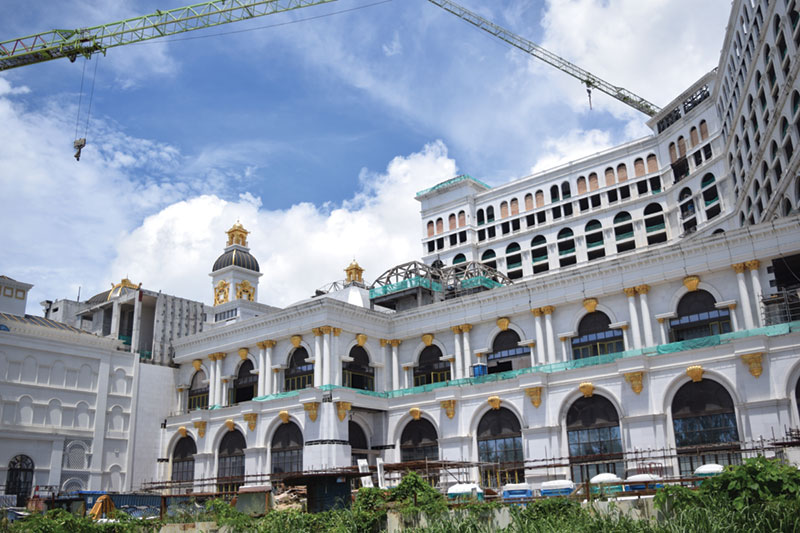 Whether CNMI’s bet on IPI ever pays off centers on three key questions: Can IPI’s Garapan casino hotel succeed? Can IPI build it? Can CNMI regulate it?
Whether CNMI’s bet on IPI ever pays off centers on three key questions: Can IPI’s Garapan casino hotel succeed? Can IPI build it? Can CNMI regulate it?
“Gaming can be an amenity in Saipan, it can’t be what drives tourism,” Global Market Advisors Managing Partner Steve Gallaway says.
“A well-run beachfront casino hotel can succeed in Saipan, however IPI have gone about it all wrong,” adds iGamiX Director of Casino Operations Eric Coskun. “IPI’s Garapan project, from a casino perspective, is twice as big as what is required here, however the number of hotel rooms is probably a little on the low end.”
When completed, the Paul Steelman designed Imperial Palace‧Saipan will accommodate 193 gaming tables and 365 machines, plus 329 guest rooms and 15 villas.
EuroPacificAsia Consulting Managing Partner Shaun McCamley, senior vice president for gaming when Tinian Dynasty debuted in 1998, estimates 500 rooms “would allow IPI to house sufficient patrons from China and other parts of Asia.”
CASHA FLOW
In July last year, IPI paid US$23.7 million for a 50% stake of American Sinopan, developing a hotel complex north of Garapan with the potential for 1,700 rooms now dubbed Imperial Casha. IPI’s license allows multiple casinos, though it has not yet proposed gaming at Imperial Casha. IPI has proposed amending its license agreement to include hotel rooms at different locations to fulfill its US$2 billion and 2,000 guest room development obligations, or even transfer that obligation to other entities, plus extending the 28 February completion deadline for its Garapan hotel, already twice extended from its original August 2017 deadline.
“I truly believe that they have not had any intention of finishing the [Garapan] hotel,” says Glen Hunter, whose lawsuit induced Governor Torres to admit breaking the law to pass casino legalization. Proprietor of beachfront café The Shack, Hunter believes it makes better business sense for IPI to run the casino without the expense of a hotel. He’s also skeptical Saipan needs the mandated 2,000 hotel rooms.
McCamley, who has consulted in CNMI occasionally since his Tinian stint, believes IPI “are trying their best to complete the facility.”
IPI’s 2019 annual report states it spent US$879 million through last year on the project expected to cost US$600 million to complete. “I cannot speculate on the amount they have paid, but do not see anything close to US$900 million in construction work in place on this project,” Pacific Rim Group President Keith Stewart says. Based in Guam, Pacific Rim has won a US$6.9 million judgment against IPI for unpaid bills. IPI has countersued, alleging Pacific Rim failed to meet contract terms, and is fighting Pacific Rim efforts to seize its property and cage cash to satisfy the judgment.
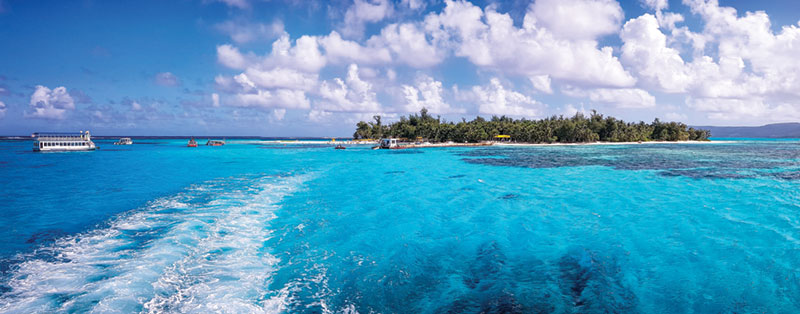 Pacific Rim began working with IPI in early 2018 and estimates it could have completed Imperial Palace Saipan by the end of 2019.
Pacific Rim began working with IPI in early 2018 and estimates it could have completed Imperial Palace Saipan by the end of 2019.
“Unfortunately, IPI had other plans,” Stewart says, noting that after authorities extended the construction deadline, IPI terminated Pacific Rim’s contract. The contractor claims IPI also brought in illegal workers and shortchanged it on payments. Stewart adds Pacific Rim “would still be interested in completing this project, but not with IPI’s involvement.”
DECISION TIME
With the latest completion deadline looming, CNMI authorities can give IPI another extension, or suspend or revoke its license.
“IPI must be held accountable for all its legal and contractual obligations,” Representative Sablan says. “Unfortunately, the CNMI government is in many ways falling short of its own duties to hold IPI accountable.”
If IPI were to lose its license, it’s uncertain another casino operator would step in. McCamley believes a new operator would demand the government adjust the development requirement and fee structure, plus address issues of regulatory “stability, transparency and a culture of compliance.”
On the travel side, McCamley contends, “CNMI authorities have not envisioned a competitive and well bundled tourism destination.”
“There are far too many worrying regulatory and governmental issues,” Coskun adds. iGamiX oversees Club C, one of two electronic gaming parlors in Saipan licensed by the Finance Department, that with ubiquitous poker machines generated revenue of around US$30 million last year. “There are some parties that, if the terms were right, would gladly step in, however most, not all, of them would not bring any real value to the project and especially the CNMI.”
Says Sablan, “I take solace in the long view of our history, and in our resilience as a community. The people of the Marianas have survived colonial occupation, war, catastrophic typhoons and economic collapse. We will survive IPI.”
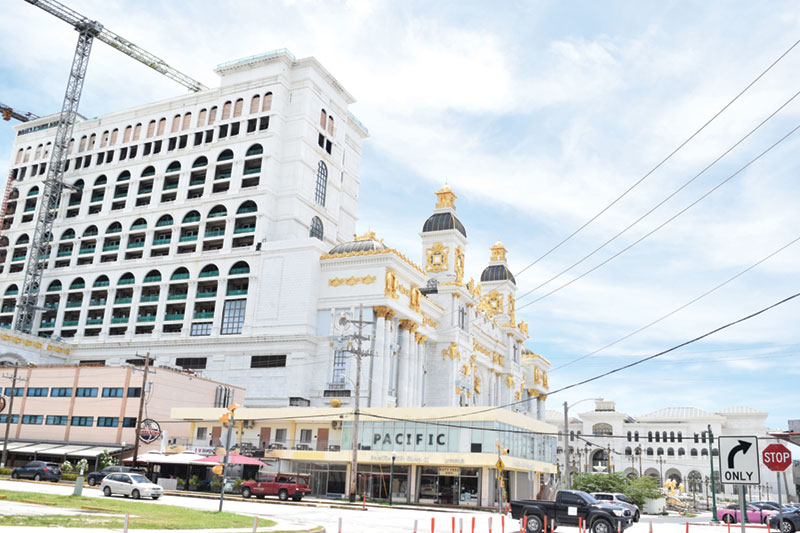 Sophisticating Saipan
Sophisticating Saipan
Donald Browne worked his way up from Atlantic City dealer to Imperial Pacific International’s Saipan CEO, after overseeing IPI gaming and, recently, security. Amid his busy early days in the new role, Browne answered a few questions from IAG Editor at Large Muhammad Cohen.
Muhammad Cohen: Is construction work continuing at Imperial Palace despite COVID-19?
Donald Browne: Yes.
MC: What has been completed to date?
DB: Villas 100%, podium level 80%, hotel tower 50%.
MC: What is the projected completion date?
DB: The pandemic has caused an additional delay , so we are moving the projected completion to the end of 2021. We are confident we can get things back on track and remain positive that we will complete this project not just for IPI, but for the future of the people of CNMI.
MC: Does Saipan need more hotel capacity to support casino operations and tourism in general?
DB: In the near term, the number of hotel rooms will be sufficient to keep pace with demand.
In the long term, we feel demand will increase as CNMI becomes a more sophisticated destination. Overall growth has been impeded by the quality of the overall guest experience. Currently the majority of rooms are occupied by tour and travel groups. We are primarily targeting FIT [free independent traveler] guests who have a propensity to spend more.
Historically the Saipan visitor has been somewhat passive. Being able to turn the passive audience into promoters will have a huge impact on loyalty and growth.
Due to the Trump Administration restrictions on visas, China tourists are predicted to decline significantly. The Marianas Visitors Authority supports the vision of attracting the Japanese market through the increase of flights from Japan in an attempt to fill the void left by the uncertainty in China arrivals. They are working diligently with the airlines to bring this to reality.
This situation further provides impetus to focus on the Japanese market. Historically in CNMI, Japanese tourist overall spend is significantly higher than our Chinese and Korean guests. However, the Japanese tourist has a much higher requirement for overall experience. The quality of our product absolutely will fulfill the requirements of a more sophisticated traveler.






